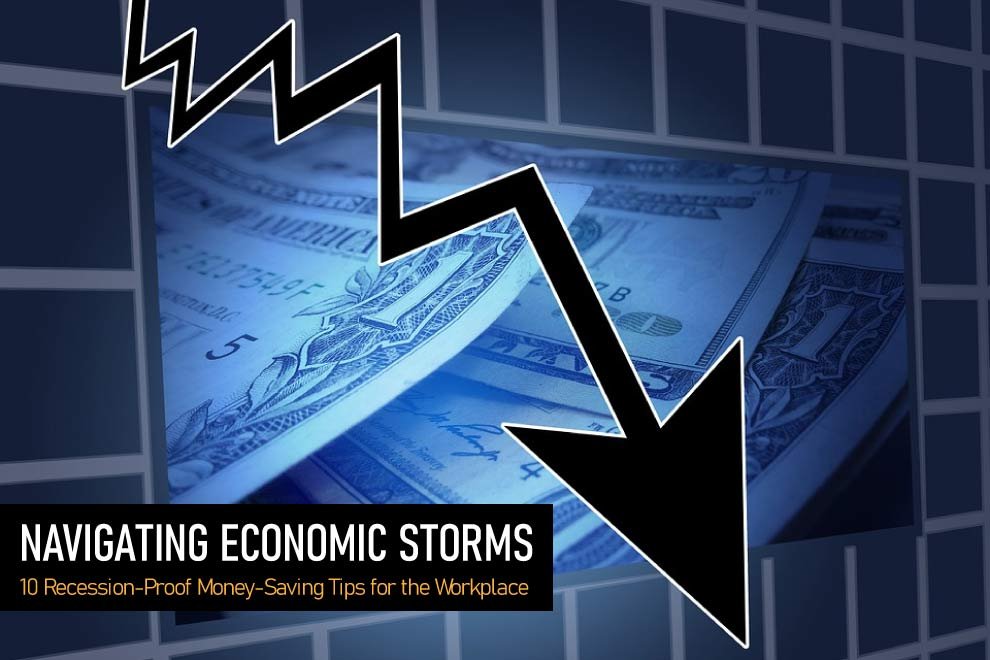Preparing for economic downturns and ensuring financial stability is important in today’s global economy. A robust financial strategy is essential to navigate the unpredictable waters of recessions and market fluctuations.
This article provides valuable insights and advice from experienced business leaders who have successfully steered their organisations through tough economic times.
Whether you’re a business owner, an employee, or someone looking to safeguard their financial future, these tips for saving money in the workplace will guide you in the face of economic uncertainty.
1. Efficient Software Resource Allocation
Efficient software resource allocation is a cornerstone of recession-proofing your workplace finances. As Phil Norton, Founder of Leave Dates, advises, “Reviewing your software subscriptions can be an easy way to reduce costs. Work out what functionalities you need, and whether you’re currently paying for unnecessary extras.” This insight rings true for businesses of all sizes. Often, we accumulate unnecessary expenses over time. By streamlining your software subscriptions and eliminating those you no longer require, you can significantly cut costs without compromising productivity.
Phil Norton’s company, Leave Dates, specialises in solving the one key problem all HR teams face – managing staff holidays. So, take a page from their book, and scrutinise your subscriptions to ensure your financial ship stays steady during economic storms.
2. Vendor Negotiation
Managing Director at Chilli Fruit Web Consulting, Milosz Krasinski stresses the importance of regularly reviewing vendor contracts and negotiating better deals. As he rightly puts it, “We were spending more than we needed to on certain services and products simply because we had not reviewed or renegotiated our contracts in some time.”
This tip applies not only to large corporations but also to small businesses. Building strong relationships with suppliers and being transparent about your financial situation can lead to better pricing and significant cost savings. Don’t overlook this simple yet effective strategy in your quest to recession-proof your finances.
3. Inventory Management
Chinmay Daflapurkar, a Senior Associate at a demolition company, emphasises optimising inventory management systems. Overstocking and inefficient resource allocation can lead to unnecessary spending. Implementing an inventory tracking system, as Chinmay suggests, can provide real-time data on inventory levels and usage patterns.
Efficient inventory management can lead to substantial savings by reducing waste and minimising unnecessary spending on storage and handling. This strategy aligns with the principle of doing more with less, a valuable approach during economic downturns.
4. Sustainable Energy Sources
Ray, the owner of Poggers, shares an environmentally conscious yet financially savvy strategy. He mentions, “We’ve made investments in technology and automation wherever feasible to enhance efficiency and decrease labour expenses.” Additionally, they have implemented energy-saving initiatives in their offices, such as switching to LED lights and installing motion sensors, resulting in significant cost savings on utility bills.
Investing in sustainable energy sources and adopting eco-friendly practices can lower operational costs and contribute to long-term financial stability. It’s a win-win situation for your workplace and the environment.
5. Automation
Athina Zisi, Chief Operations Officer at Energy Casino, suggests a key strategy to save money without sacrificing quality is “automating your customer relationship management (CRM) processes.” Her experience highlights how fragmented data collection and analysis processes can be time-consuming and costly. Implementing a centralised CRM software system can integrate customer data into one place, resulting in more efficient customer service and reduced need for manual labour and resources.
Automation can extend beyond CRM, impacting various aspects of your business. By embracing technology to handle repetitive tasks and streamline processes, you can ensure your workplace remains lean and cost-effective even during economic downturns.
6. Selective Hiring
Casey Jones, Founder and Head of Marketing at CJ&CO, advises against over-hiring. He highlights how companies hire more employees than necessary, leading to financial burdens. Casey emphasises the importance of “selective hiring to save more money while not compromising the quality of your work.”
When economic storms hit, having a lean and efficient team can be a financial lifeline. Carefully evaluate your hiring needs and avoid the temptation to over-expand during uncertain times.
7. Employee Retention
Casey Jones also underscores the significance of offering value to employees. As Casey suggests, treating your team like family can lead to increased motivation and higher retention rates. Employees who feel valued and well-treated are more likely to stay with your organisation long-term.
Employee retention can save substantial recruitment, onboarding, and training costs. Building a positive workplace culture can be a powerful tool in recession-proofing your finances.
8. AI for Automation
Junaid Raza, an SEO Consultant and Copywriter, recommends leveraging AI to automate tasks. AI tools can handle various responsibilities, reducing the need to hire experts for every task. This approach not only enhances efficiency but also reduces labour costs.
AI is not just a buzzword; it’s a practical solution to recession-proofing your workplace. Embrace technology to streamline operations and remain competitive in challenging economic conditions.
9. Monitor Spending
Libby James, Co-Founder of Merchant Advice Service, emphasises the importance of monitoring and tracking spending. Setting up a budget tracking system can provide a clear understanding of where your company’s money is being spent. This vigilance ensures you stay within budget and avoid unnecessary expenses.
A budget is your financial compass, guiding you through turbulent economic times. Regularly assess and adjust your budget to adapt to changing circumstances.
10. Cost-Effective Solutions
Jeff Lynne, Co-Founder and Operational Director at Digital8.com, advocates for seeking cost-effective solutions. He points out that opting for generic brands or more affordable alternatives can result in significant savings without sacrificing quality.
During economic storms, it’s essential to explore creative solutions and cost-effective alternatives. Don’t let brand names blind you to the potential savings found in unassuming places.
In conclusion, recession-proofing your workplace finances requires a combination of vigilance, innovation, and prudent financial strategies. The advice these seasoned business leaders share demonstrates that it’s possible to save money without compromising quality, even during economic downturns.
From efficient resource allocation to embracing automation and negotiating with vendors, these tips are your blueprint for financial resilience. You can survive and thrive in economic uncertainty by implementing these strategies and adapting them to your unique circumstances.
So, anchor yourself with these recession-proof money-saving tips, and let them guide you through the storms of economic turbulence.
This guest post was written by Phil Norton. Phil is the co-founder of Leave Dates, the staff holiday planner. He loves problem-solving and making life easier for small businesses. If you book a Leave Dates demo, he will warmly welcome you and show you everything you need to know.
ALSO READ: Blue-Collar Workers: Empowering The Backbone of Our Economy










